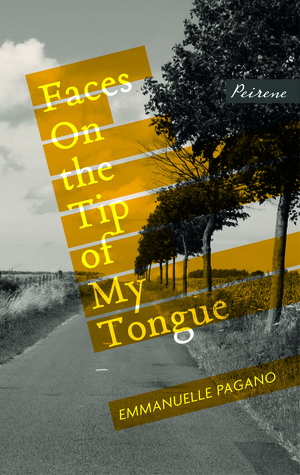Faces on the Tip of My Tongue
By Emmanuelle Pagano

Meetings, partings, loves and losses in rural France are dissected with compassion.
The late wedding guest isn’t your cousin but a drunken chancer. The driver who gives you a lift isn’t going anywhere but off the road. Snow settles on your car in summer and the sequins found between the pages of a borrowed novel will make your fortune. Pagano’s stories weave together the mad, the mysterious and the dispossessed of a rural French community with honesty and humour. A superb, cumulative collection from a unique French voice.
About The Author: Emmanuelle Pagano
Emmanuelle Pagano was born in Rodez (Aveyron) in 1969. Her novels have been translated into more than a dozen languages, and she has won multiple awards for her writing, including the EU Prize for Literature and most recently the French Ecology Novel Prize. This is her second book published in English, the first Trysting was published by And Other Stories in 2016.
Read an Excerpt
I went to the lake every summer when I was a little girl. I lived on an arc of beach bordered by wooden fences and a forest so thick that we didn’t make dens in the trees but dug them in the undergrowth instead.
My uncle had built a house on this strip of shore, then a hut for tools and the pedalo, and some wonky terraces where the land sloped down to the rippling water. Near the reeds, right up close to their rustling song and their birds’ nests, he had marked out a meadow where we went in search of sunshine and games. Away from these games, he had coaxed a garden into life, and my aunt picked fresh carrots there as snacks for me, the cosseted little niece.
One evening, for a surprise, my uncle set a ladder against the tallest tree and hung a swing from it, but I’d always hated swings – the speed frightened me. Of the chill, taciturn lake I had no fear. I usually felt the cold, but with the lake it was different: I used to swim across it and cycle around it, and felt at home there.
Swollen by the weir, its dark mass came right up to the little room whose French windows framed my nights each summer. I slept in a narrow alcove that could be closed off from the rest of the house, with sliding panels between it and the living room.
We would eat there when it was too cold for noisy, open-air meals, and it was also the place for board games, homework, drawing, topping and tailing beans, and writing postcards. We did lots of things in that corner of the house, because we could sit there all crammed in together, with the spectacle of the lake before us. My aunt used to claim that there wasn’t enough room in the bedrooms so I had to sleep in the alcove, and although she never said so, I know she was giving me the best holiday spot, the sofa in that recess, a nook looking almost directly on to the water.
I was the lake’s favorite. I loved my life by the lake so much that it was worth going away for a while, if only for the pleasure of coming back.

Continue Reading…
Article originally Published in the October/November 2019 Issue “Read Global”
